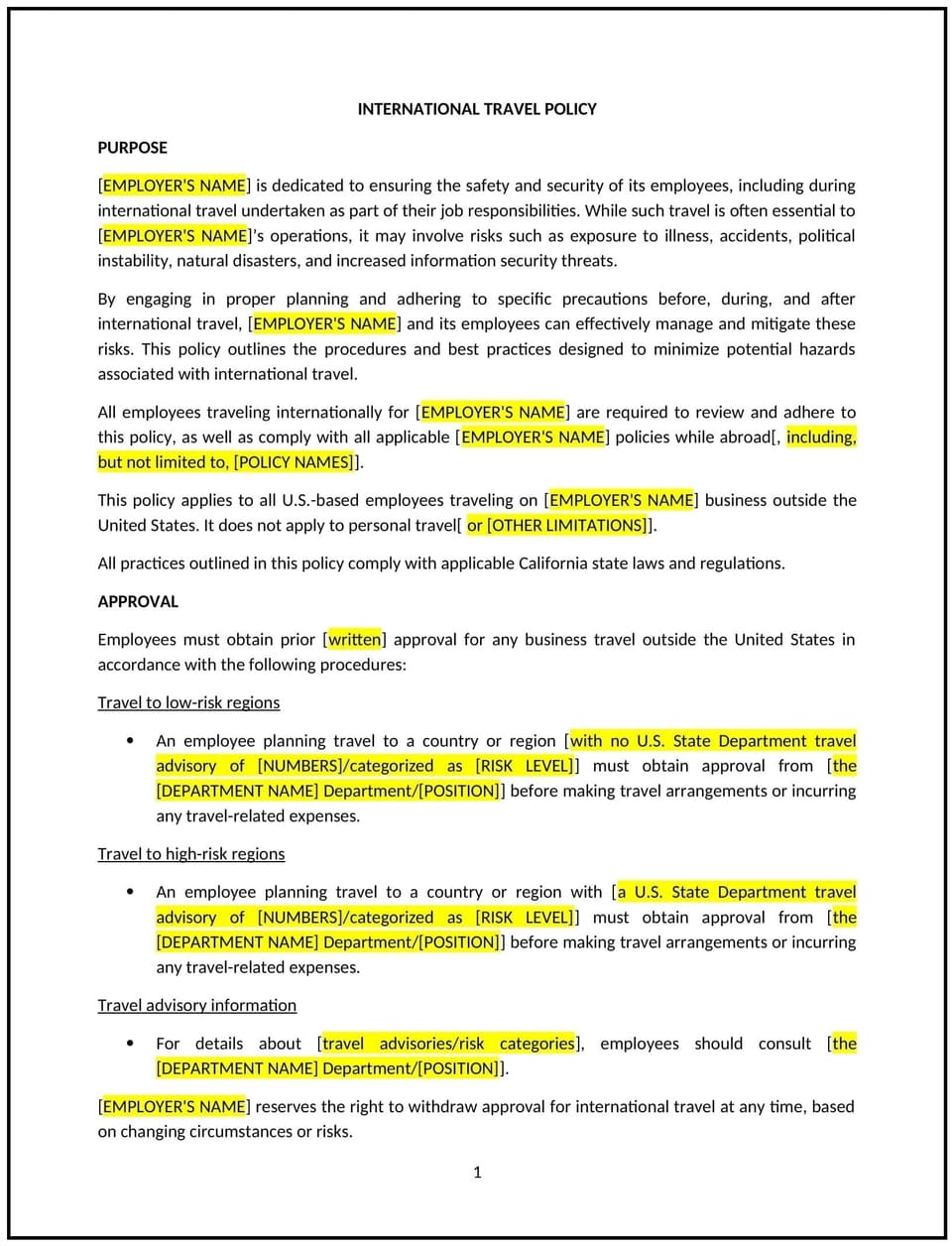International travel policy (California): Free template

International travel policy (California)
In California, an international travel policy provides businesses with guidelines for managing employee travel abroad for business purposes. This policy ensures that travel is conducted efficiently, safely, and in compliance with California labor laws and federal regulations, such as the Fair Labor Standards Act (FLSA).
This policy outlines procedures for planning travel, reimbursement guidelines, safety protocols, and employee responsibilities. By implementing this policy, California businesses can facilitate smooth international travel while minimizing risks and ensuring consistency.
How to use this international travel policy (California)
- Define travel purposes: Specify the types of international travel covered by the policy, such as conferences, client meetings, or training sessions.
- Establish approval procedures: Outline steps for obtaining approval for international travel, including submitting travel plans and budgets.
- Address expenses: Provide clear guidelines for allowable travel expenses, reimbursement procedures, and required documentation.
- Ensure safety: Include protocols for employee safety, such as health precautions, emergency contacts, and adherence to local laws.
- Communicate expectations: Clarify employee responsibilities during travel, such as maintaining professional conduct and submitting expense reports promptly.
Benefits of using this international travel policy (California)
This policy offers several advantages for California businesses:
- Supports compliance: Reflects California labor laws and federal travel-related regulations to ensure lawful practices.
- Promotes safety: Helps employees prepare for international travel and address potential risks proactively.
- Reduces costs: Establishes clear expense guidelines to prevent overspending and ensure budget adherence.
- Encourages accountability: Provides consistent procedures for planning and reporting travel activities.
- Enhances efficiency: Streamlines the approval and reimbursement processes, reducing administrative burdens.
Tips for using this international travel policy (California)
- Reflect California-specific considerations: Address state labor laws, such as wage and hour compliance during travel time.
- Partner with travel agencies: Use reputable travel services to ensure efficient planning and cost management.
- Provide training: Offer guidance on travel safety, cultural sensitivity, and expense reporting before international trips.
- Monitor compliance: Regularly review travel plans and expenses to ensure alignment with the policy and budget.
- Review regularly: Update the policy to reflect changes in travel regulations, business practices, or geopolitical conditions.
Q: How does this policy benefit the business?
A: This policy supports compliance with California and federal regulations, promotes employee safety, and ensures cost-effective travel management.
Q: What types of expenses are covered under this policy?
A: Covered expenses may include airfare, lodging, meals, ground transportation, and other reasonable costs directly related to business travel.
Q: How does this policy support compliance with California laws?
A: The policy reflects wage and hour laws, ensuring fair compensation for time worked during travel and adherence to expense reimbursement requirements.
Q: What steps should employees take to prepare for international travel?
A: Employees should obtain travel approval, review safety protocols, and submit necessary documents, such as itineraries and visa applications.
Q: How can the business ensure safety during international travel?
A: The business can provide pre-travel training, maintain emergency contact procedures, and monitor geopolitical conditions to mitigate risks.
This article contains general legal information and does not contain legal advice. Cobrief is not a law firm or a substitute for an attorney or law firm. The law is complex and changes often. For legal advice, please ask a lawyer.


